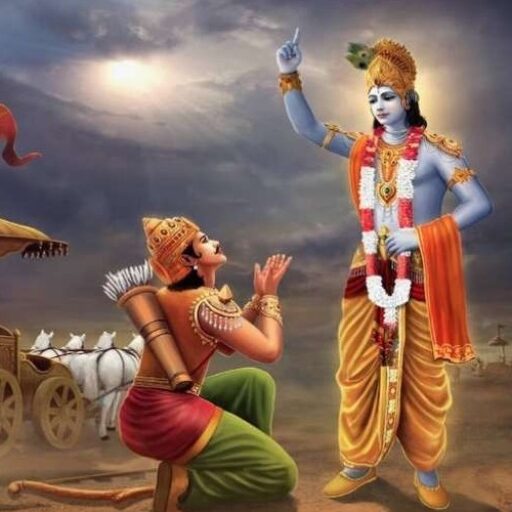@ श्रीमद्भगवद्गीता
व्यासेन ग्रथितां पुराणमुनिना मध्ये महाभारते
– श्रीमद्भगवद्गीता ध्यानम्
अद्वैतामृतवर्षिणीं भगवतीमष्टादशाध्यायिनीं
The Bhagavad Gita is a profound spiritual text that offers invaluable insights into the nature of existence, the principles of righteous living, and the paths to spiritual enlightenment. Its teachings have the power to transform individuals, enabling them to lead a life of purpose, integrity, and inner fulfillment. The Bhagavad Gita stands as a timeless beacon of wisdom, guiding humanity towards self-realization and the realization of the divine.

The Bhagavad Gita, is a treasured and revered scripture in Hindu philosophy. It is a profound philosophical discourse that unfolds in the epic Mahabharata, where Krishna, an incarnation of the divine Lord Vishnu, imparts profound wisdom and guidance to his friend and disciple, Arjuna.
The Gita serves as a dialogue between Krishna and Arjuna on the battlefield of Kurukshetra, just before the commencement of a great war. Arjuna, a skilled warrior, finds himself overwhelmed with moral dilemma and confusion about the righteousness of the battle. In this state of distress, he turns to Krishna for counsel.
Krishna’s teachings in the Bhagavad Gita transcend the immediate context of war, encompassing timeless wisdom applicable to every aspect of human existence. The Gita delves into deep philosophical concepts, exploring topics such as duty (dharma), selfless action (karma yoga), devotion (bhakti), meditation (dhyana), and the nature of reality (Brahman).
One of the key teachings of the Bhagvad Gita is the importance of performing one’s duty without attachment to the results. Krishna emphasizes the significance of selfless action, where individuals should focus on their responsibilities and obligations rather than the outcomes. This teaching encourages individuals to act with sincerity, integrity, and dedication, while surrendering the desire for personal gains or rewards.
The Bhagvad Gita also emphasizes the unity of all beings and the interconnectedness of life. Krishna teaches Arjuna that the eternal soul (Atman) within each being is indestructible and that the physical body is merely a temporary vessel. This understanding encourages individuals to look beyond superficial differences and perceive the underlying unity that binds all living entities.
Furthermore, the Gita elucidates various paths of spiritual realization, such as the path of knowledge (jnana yoga), the path of devotion (bhakti yoga), and the path of selfless action (karma yoga). It acknowledges that different individuals have different inclinations and aptitudes, and therefore, there are multiple avenues for attaining spiritual enlightenment and liberation.
The Bhagavad Gita’s teachings provide practical guidance on how to live a fulfilling and purposeful life, harmonizing worldly responsibilities with spiritual growth. It instills principles of moral righteousness, self-discipline, equanimity, and the pursuit of knowledge. Moreover, it elucidates the concept of surrendering one’s ego to the divine will and finding inner peace through unwavering devotion and faith.
The timeless wisdom of the Bhagavad Gita has transcended the boundaries of time, culture, and religion. Its teachings have influenced countless individuals, from scholars and philosophers to seekers of truth and those seeking guidance in navigating the complexities of life. The Gita continues to inspire and enlighten people of diverse backgrounds, inviting them to reflect on their own lives, duties, and spiritual paths.